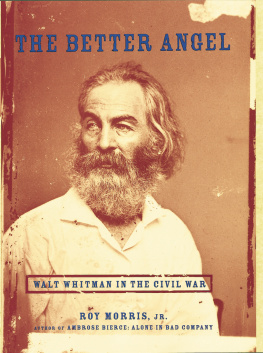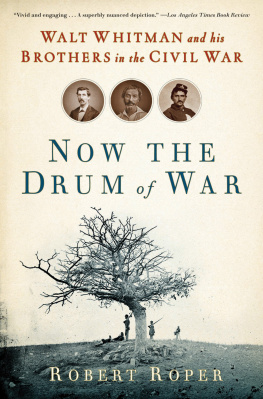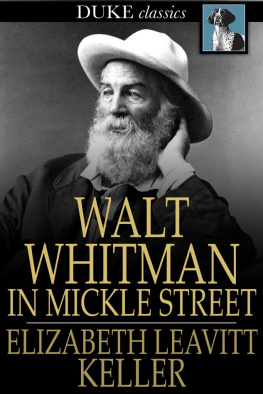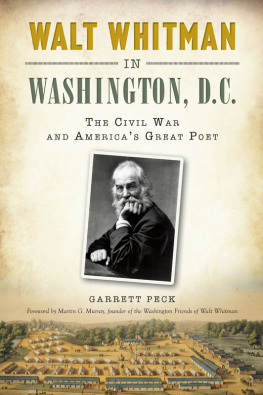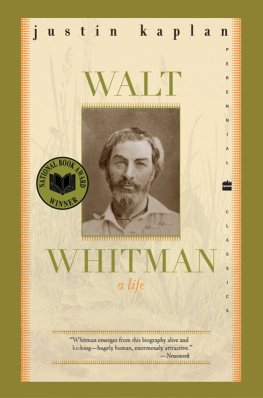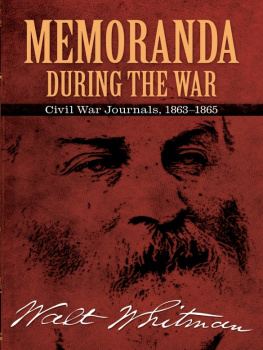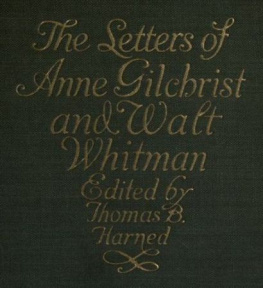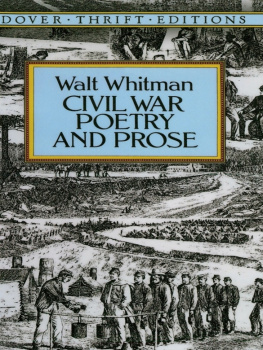Roy Morris Jr. - The Better Angel: Walt Whitman in the Civil War
Here you can read online Roy Morris Jr. - The Better Angel: Walt Whitman in the Civil War full text of the book (entire story) in english for free. Download pdf and epub, get meaning, cover and reviews about this ebook. year: 2000, publisher: Oxford University Press, USA, genre: Non-fiction / History. Description of the work, (preface) as well as reviews are available. Best literature library LitArk.com created for fans of good reading and offers a wide selection of genres:
Romance novel
Science fiction
Adventure
Detective
Science
History
Home and family
Prose
Art
Politics
Computer
Non-fiction
Religion
Business
Children
Humor
Choose a favorite category and find really read worthwhile books. Enjoy immersion in the world of imagination, feel the emotions of the characters or learn something new for yourself, make an fascinating discovery.
- Book:The Better Angel: Walt Whitman in the Civil War
- Author:
- Publisher:Oxford University Press, USA
- Genre:
- Year:2000
- Rating:3 / 5
- Favourites:Add to favourites
- Your mark:
The Better Angel: Walt Whitman in the Civil War: summary, description and annotation
We offer to read an annotation, description, summary or preface (depends on what the author of the book "The Better Angel: Walt Whitman in the Civil War" wrote himself). If you haven't found the necessary information about the book — write in the comments, we will try to find it.
In The Better Angel, acclaimed biographer Roy Morris, Jr. gives us the fullest accounting of Whitmans profoundly transformative Civil War Years and an historically invaluable examination of the Unions treatment of its sick and wounded. Whitman was mired in depression as the war began, subsisting on journalistic hackwork, wasting his nights in New Yorks seedy bohemian underground, his great career as a poet apparently stalled. But when news came that his brother George had been wounded at Fredericksburg, Whitman rushed south to find him. Though his brothers injury was slight, Whitman was deeply affected by his first view of the wars casualties. He began visiting the camps wounded and, almost by accident, found his calling for the duration of the war. Three years later, he emerged as the wars most unlikely hero, a living symbol of American democratic ideals of sharing and brotherhood.
Instead of returning to Brooklyn as planned, Whitman continued to visit the wounded soldiers in the hospitals in and around the capital. He brought them ice cream, tobacco, brandy, books, magazines, pens and paper, wrote letters for those who were not able and offered to all the enormous healing influence of his sympathy and affection. Indeed, several soldiers claimed that Whitman had saved their lives. One noted that Whitman seemed to have what everybody wanted and added When this old heathen came and gave me a pipe and tobacco, it was about the most joyful moment of my life. Another wrote that There is many a soldier that never thinks of you but with emotions of the greatest gratitude. But if Whitman gave much to the soldiers, they in turn gave much to him. In witnessing their stoic suffering, in listening to their understated speech, and in being always in the presence of death, Whitman evolved the new and more direct poetic style that was to culminate in his masterpiece, When Lilacs Last in the Dooryard Bloomd.
Brilliantly researched and beautifully written, The Better Angel explores a side of Whitman not fully examined before, one that greatly enriches our understanding of his later poetry. More than that, it gives us a vivid and unforgettable portrait of the other army--the legions of sick and wounded soldiers who are usually left in the shadowy background of Civil War history--seen here through the unflinching eyes of Americas greatest poet.
Roy Morris Jr.: author's other books
Who wrote The Better Angel: Walt Whitman in the Civil War? Find out the surname, the name of the author of the book and a list of all author's works by series.

